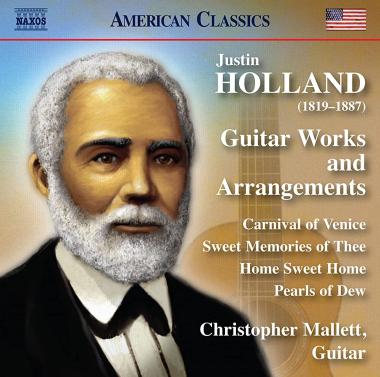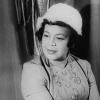
Justin Holland (1819–1887) was the first Black musician to achieve widespread recognition as a guitarist and the most prolific American guitarist/composer and arranger of his era. Holland wrote the first bestselling guitar method in the United States and was also a leading voice in the antislavery movement. An important new Naxos recording by Christopher Mallett, Justin Holland: Guitar Works and Arrangements, reveals an important and previously hidden chapter in the history of classical guitar.

In the album’s excellent liner notes, Kim Perlak tells us, “In the context of the classical guitar lineage, Holland’s American career parallels that of the European masters. Holland began his guitar study in 1833, six years before the death of [Fernando] Sor. He began publishing in 1848, one year before [Dionisio] Aguado’s death. Holland’s method was published in 1874, three years before Francisco Tárrega’s concert debut in 1877. Twenty-one years after his own death, Holland’s method entered its final publication, in 1908, one year before the European concert debut of Andrés Segovia (1893–1987), the guitarist considered to be ‘the father of the modern classical tradition.’ By the time Segovia gave his American debut in New York’s Town Hall, on Jan. 8, 1928, Holland’s work had inspired a vibrant American classical guitar community.”
Holland was born to free Black parents in Norfolk County, Virginia, in a neighborhood that included Black Americans freed by self-purchase, manumission, and court order. The area became increasingly dangerous for young Black men as more demand in the Deep South made slavery increasingly profitable, and Holland’s family moved to Boston in 1833. There, the 14-year-old Justin studied music with Spanish guitarist Mariano Perez and members of the Philharmonic Society of Boston. Further training at the Oberlin Conservatory and study abroad helped Holland become an accomplished musician.
His published works consist of inventive, well-crafted compositions and arrangements of musical styles popular in 19th-century America: marches reminiscent of Holland’s famous contemporary Stephen Foster, hymns like “Nearer, My God, to Thee,” popular songs like “Home Sweet Home,” and compositions in the classical style of Sor. Holland is always creative in his arrangements, featuring brilliant scales and arpeggios, utilizing the entire fingerboard of the guitar, and showcasing sentimental melodies, lush harmonies, and playful rhythmic invention.
While Holland’s race undoubtedly limited his ability to tour as a performing artist, publishing his music allowed him to become immensely popular among a public ignorant of his background. It was incredibly difficult for a Black man to have a professional career in mid-19th-century America, and Holland’s achievements are more notable than any white guitarist of the era. In addition, this remarkable man was also a leader at National and State Negro Conventions and active in the Underground Railroad.
Mallett is an ideal interpreter of this music. Already know as an advocate of new compositional voices because of his Duo Noire recording of works by diverse women composers, Mallett brings a questing and curious mindset to Holland’s oeuvre. He performs with a beautiful sound, a varied tonal palette, absolute clarity of phrasing, and a nuanced appreciation for Classical and Romantic styles. His performance of Holland’s most significant composition, Carnival of Venice, Fantaisie, is a tour de force.
Alternately stately and humorous, legato and staccato, chordal and ornately melodic, virtuosic and offhand, Mallett elegantly shows us all Holland and the 19th-century guitar have to offer.



